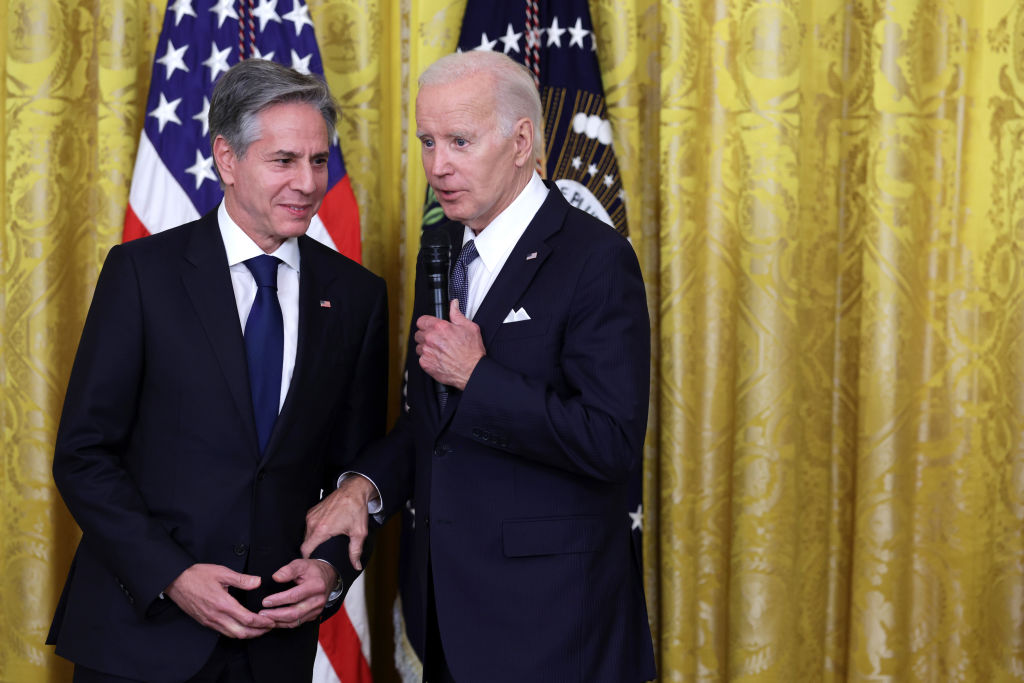Iran’s nuclear program is escalating. The International Atomic Energy Agency (IAEA), the U.N. nuclear watchdog, released new quarterly reports on Monday showing the Islamic Republic has added to key enriched uranium stockpiles, enhancing its ability to make nuclear weapons-grade material. Even so, the Biden administration appears to be moving ahead with a deal that provides Tehran at least $16 billion in sanctions relief, along with unprecedented oil exports.
Last spring, the Biden administration reportedly reached a secret, unwritten understanding with Iran that, among other steps, called for the regime to slow its accumulation of uranium enriched to 60 percent purity in return for $10 billion in frozen Iranian assets held in Iraq. After that initial step, and once the U.S. arranged the release of $6 billion in Iranian assets held in South Korea, the two sides would execute a separate U.S. hostages-for-Iranian-prisoners swap. Both processes are reportedly underway.
Washington is squandering valuable financial leverage while Iran expands its nuclear program—and the Biden administration is setting itself up for future extortion when the regime uses its nuclear program to demand more concessions. If the White House won’t take action to stop Iran from acquiring a nuclear weapon, it’s up to Congress to use its statutory authorities to exert oversight of the administration’s catastrophic efforts and halt them.
The latest IAEA data, circulated in reports to member states, indicates that Tehran has increased its 5, 20, and 60 percent enriched uranium stockpiles since May. Uranium is considered weapons-grade at 90 percent purity, and these increased stockpiles means Iran possesses sufficient enriched uranium to make enough weapons-grade uranium (WGU) for several nuclear weapons within three months.
To be sure, since the IAEA’s last report in May, Iran slowed its standard rate of accumulating 60 percent enriched uranium. Yet Tehran still added to this stockpile overall.
Iran added to its 5 and 20 percent enriched uranium stockpiles, which directly affect Tehran’s breakout time. Because the mass of material decreases as the enrichment level rises and fewer centrifuges are needed, by producing 5 and 20 percent enriched uranium, the regime has already done most of the work required to make WGU. Five percent enrichment, for example, entails roughly 70 percent of the effort to make WGU, while 20 percent enrichment entails around 90 percent of the effort. Thus, any deal that does not address Iran’s 5 and 20 percent stocks is mostly symbolic.
Tehran also did not comply with another reported administration demand—that it cease deploying new sets of planned, faster centrifuges to enrich uranium. Iran installed one new set and still has thousands of the machines stockpiled or enriching.
Moreover, despite Washington’s demand that Tehran cooperate with the IAEA on a separate inquiry into two sites where the regime allegedly carried out nuclear weapons work or stored related equipment, the IAEA reports there has been no progress.
These failures suggest not only that Iran remains motivated to continue covert nuclear weapons work, but that it is unwilling to abide by the most basic of Biden’s terms.
The good news is that Congress can exercise its oversight rights to ascertain the extent of Washington’s understandings and sanctions relief plans with Tehran. Congress can do this by insisting the administration transmit documentation and provide timely briefings.
Under the 2015 Iran Nuclear Agreement Review Act (INARA), Congress can demand that the administration transmit for review any nuclear agreement, and the law defines “agreement” broadly enough to include informal or unwritten arrangements. The statute allows for congressional review of any nuclear deal in which “the United States agrees to take action, regardless of the form it takes, whether a political commitment or otherwise, and regardless of whether it is legally binding or not.”
If Congress is dissatisfied with the Iran agreement or associated relief, it has 60 days to pass a joint simple majority resolution of disapproval to prevent the administration from directing additional revenue to the Islamic Republic. Even though Congress is divided, there is broad bipartisan distaste for funding Iran’s malign activities. Members may be able to circumvent a certain presidential veto of such a resolution, provided that Senate Democrats stand firmly against Biden’s Iran deal on the basis of the grave threat it poses to U.S. and international security.
The Biden administration is ceding valuable leverage to Tehran for illusory nuclear concessions while underwriting future extortion and a scale-up of Iran’s terrorist activities. It’s time for Congress to intervene before more damage is done.






Please note that we at The Dispatch hold ourselves, our work, and our commenters to a higher standard than other places on the internet. We welcome comments that foster genuine debate or discussion—including comments critical of us or our work—but responses that include ad hominem attacks on fellow Dispatch members or are intended to stoke fear and anger may be moderated.
With your membership, you only have the ability to comment on The Morning Dispatch articles. Consider upgrading to join the conversation everywhere.